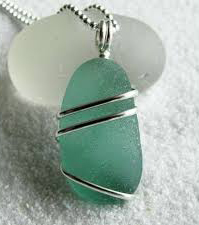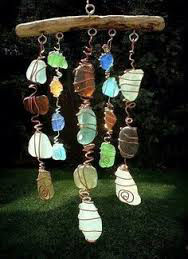 On our family beach trip this past summer, our grandchildren discovered sea glass. For our five preschoolers, it was like finding treasure. In fact, that’s what they called it: “Let’s go find some more treasures!” You probably know that the pieces of sea glass we found are fragments of old bottles or containers that have been sanded smooth and frosty by the wave action and the power of friction with sand and stones. While the physics of that process are lost on the kids, there is no denying their admiration for the end product.
On our family beach trip this past summer, our grandchildren discovered sea glass. For our five preschoolers, it was like finding treasure. In fact, that’s what they called it: “Let’s go find some more treasures!” You probably know that the pieces of sea glass we found are fragments of old bottles or containers that have been sanded smooth and frosty by the wave action and the power of friction with sand and stones. While the physics of that process are lost on the kids, there is no denying their admiration for the end product.
Each day we would walk the shoreline looking carefully and (sometimes) patiently for sea glass. We were on the shore in Connecticut, and the pieces were small and relatively rare. Each discovery was announced by a yelp or shrill shout of, “Look, there’s one!!” During the week, we accumulated a nice collection for display. No doubt, we will add to it in the years to come.
I thought about our sanded glass experience in recent weeks, as I have watched people in churches wrestle with being and doing faith life in the 21st century.
Some sanded glass observations:
1. Sanded glass started out as a common beverage container that has been gradually transformed into something new. Each of those glass shards had to go through a metamorphosis to become this new entity. Pounded by the waves and roiled in the sand and stones, the ordinary glass becomes something very different. Some sanded glass becomes beautiful artwork or jewelry. Others are put on display. What was taken for granted originally becomes something that is treasured and valuable.
2. That change didn’t come until the bottle was broken. It had to give up life as a beverage container to become a beautiful piece of art. While not its creator’s original intent, one can make the case that the sanded glass version is a valuable upgrade over its original design.
art. While not its creator’s original intent, one can make the case that the sanded glass version is a valuable upgrade over its original design.
3. Those sharp edges had to go. Generally, we avoid pieces of broken glass out of our fear of being cut. The incessant wave action, over time, creates an object that is both beautiful and safe.
4. Most beach glass comes from careless and irresponsible pollution of our streams and oceans. Litter is transformed into art. Recycling is a key part of nature’s way of healing itself of the wounds humanity inflicts upon it.
5. Finding sanded glass on the beach is much more satisfying than putting pieces of glass into a mechanical tumbler and trying to artificially create the same product. Something about knowing that these fragments have been on the ocean floor for many years prior to our discovering them makes a big difference.
6. The more the better. Sanded glass is best displayed in a collection. I lived in Hawaii for a year and ended up with a large container of sanded glass that is stunning in its beauty and variety. While each piece is unique, when they are joined with others, the effect is to magnify each of them.
Some feeble attempts at application for congregations:
1. We often think we know what church should be and look like. We have our ideas and do not really want to consider the possibility that God may have other designs for us than what we have in mind. Our certainty blinds us to what could be.
2. Being broken is painful and uncomfortable. The known is comfortable and familiar. We like our control and predictability. The idea of being made into something very different evokes strong emotions and resistance.
 3. Our culture has a way of leaving many of us with jagged, sharp edges. As we are injured or wounded, so we tend to wound others, either deliberately or inadvertently. The end result is a culture on edge, with latent anger simmering just beneath the surface in individuals and organizations. Having those sharp edges sanded away requires exposing ourselves to forces that disagree and push back against us.
3. Our culture has a way of leaving many of us with jagged, sharp edges. As we are injured or wounded, so we tend to wound others, either deliberately or inadvertently. The end result is a culture on edge, with latent anger simmering just beneath the surface in individuals and organizations. Having those sharp edges sanded away requires exposing ourselves to forces that disagree and push back against us.
4. Scripture is full of stories of God recycling women and men who were flawed, jagged, broken individuals. In addition, there are numerous stories of how actions that were taken with negative intent are transformed into life-giving and life-transforming celebrations of providential love. Everyone will either learn this lesson and celebrate it, or will waste their life resisting it.
5. There is no substitute for the experience of careful spiritual discernment of God’s will/vision for us. You cannot find your deep purpose or meaning in someone else’s experience. You must go through the sanding process yourself.
6. Christ followers are at their best and have their best moments in community. While faith is a deeply personal and individual experience, it only finds its full expression in a collection of faithful people. There is no substitute for a healthy collection of Christ followers.
Finding sanded glass really is a treasure hunt. Finding beautiful examples of God’s love at work in the lives of people is, too.
Happy hunting.
